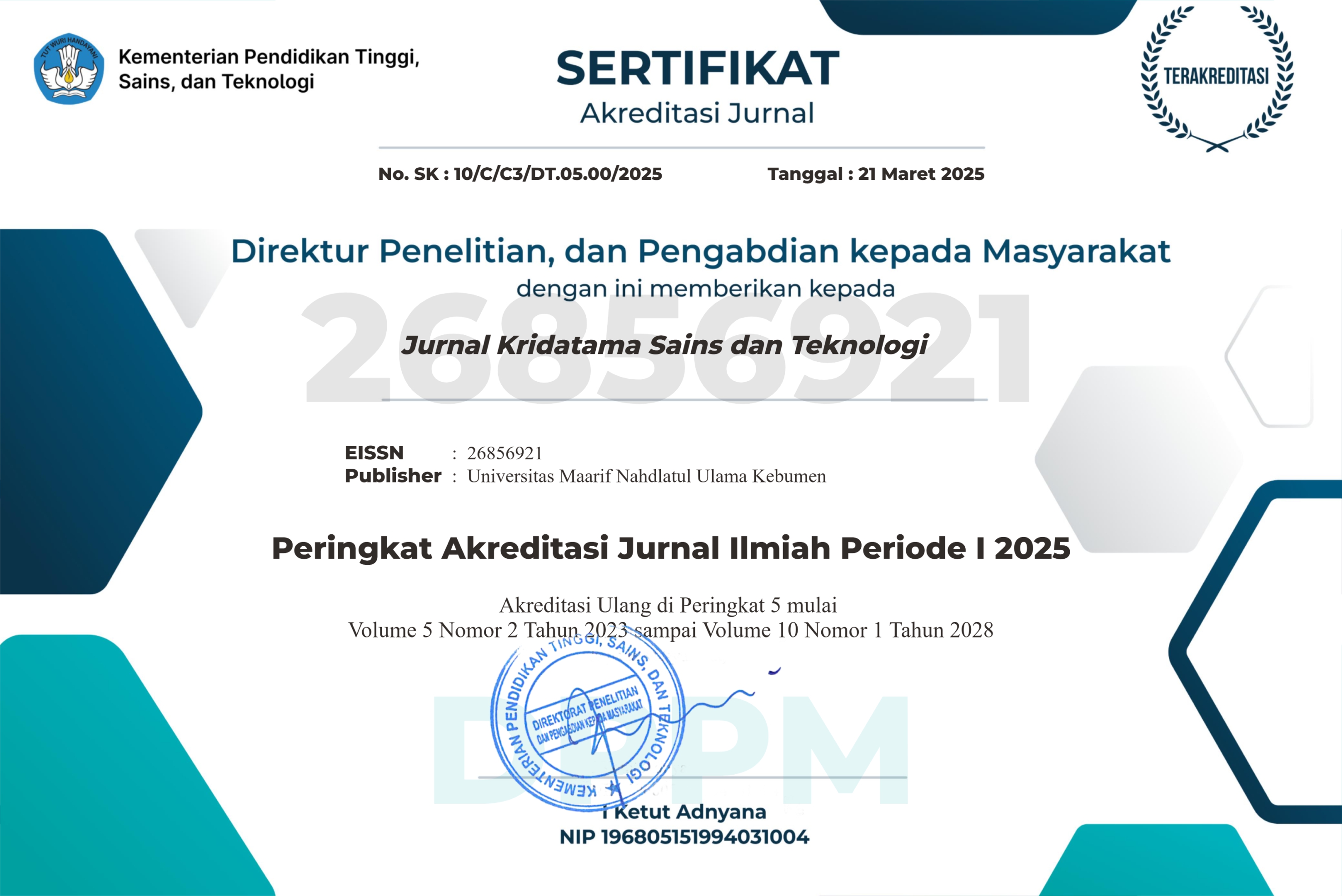Durabilitas Campuran Aspal Emulsi Dingin dengan Substitusi Serbuk Karet Ban Bekas sebagai Agregat Halus
DOI:
https://doi.org/10.53863/kst.v7i02.1888Keywords:
Crumb rubber, Durability, Emulsion asphalt, Fine aggregate, MarshallAbstract
The increasing number of motor vehicles in Indonesia has led to a rise in waste tires, which are difficult to decompose naturally. Utilizing this waste as road construction material aligns with the principles of reduce, reuse, and recycle. This study aims to analyze the effect of waste tire crumb rubber as a fine aggregate substitute on the Marshall characteristics and volumetric parameters of Cold Asphalt Emulsion Mixture (CAEM). The experimental method was conducted using five substitution levels (0%, 5%, 10%, 15%, and 20%), which were tested using the Marshall Test to determine stability, flow, Marshall Quotient (MQ), and volumetric parameters (VIM, VMA, VFA). The addition of recycled rubber from waste tires influences the mechanistic behavior of asphalt mixtures. Test results show a trend of increasing VIM and decreasing VMA and VFA, with the optimal void balance achieved at a rubber content of 5–10%. The elastomeric properties of the rubber particles enhance the elastic deformation capacity, thereby improving the mixture’s flexibility up to a 5% content. At 10%, the flow value decreases, indicating greater stiffness or stability. Higher contents tend to disrupt the continuity of the asphalt matrix and weaken the aggregate bonding, consistent with the material’s viscoelastic behavior. Therefore, a 5% rubber content provides the best balance between stability, flexibility, and void characteristics, while also improving the durability of the asphalt mixture. The use of this material offers environmental benefits by reducing solid waste and supporting the concept of sustainable development in pavement construction. Further studies are recommended to include water susceptibility tests, evaluations of plastic deformation under repeated loading, and field-scale testing to verify performance under actual service conditions
References
FaritzieHijriah, H. Al, Umari, Z. F., & Panjaitan, R. (2021). Analisis Kadar Optimum Serbuk Karet Ban Dalam Bekas Pada Campuran Aspal. TAPAK (Teknologi Aplikasi Konstruksi) : Jurnal Program Studi Teknik Sipil, 11(1), 29. https://doi.org/10.24127/tp.v11i1.1784
Huang, Z., Lu, R., Fu, Z., Li, J., Li, P., Wang, D., Wei, B., Zhu, W., Wang, Z., & Wang, X. (2023). Investigation of Viscoelastic Properties of Polymer-Modified Asphalt at Low Temperature Based on Gray Relational Analysis. Sustainability (Switzerland), 15(8). https://doi.org/10.3390/su15086858
Karyawan, I. D. M. A., Anshari, B., Rahmatin, I. P., Sideman, I. A. O. S., & Mahendra, M. (2024). Performance of Modified Buton Asphalt with Marine Fuel Oil in Asphalt Pavement Mixtures. Applied Mechanics and Materials, 924, 153–162.
Karyawan, I. D. M. A., Kencanawati, N. N., Hariyadi, H., Hasyim, H., & Rohani, R. (2023). Karakteristik Aspal Buton Ekstraksi yang Dimodifikasi dengan Oli Bekas dan Plastik HDPE. Rekonstruksi Tadulako: Civil Engineering Journal on Research and Development, 4(2), 79–86. https://doi.org/10.22487/renstra.v4i2.596
Karyawan, I. D. M. A., Mahendra, M., BuanAnshari, & Setiawan, E. (2023). Konsistensi dan Setting Time Bubur Aspal Emulsi Menggunakan Filler Fly Ash dan Mastic Asbuton. Siklus : Jurnal Teknik Sipil, 9(2), 176–188.
Karyawan, I. D. M. A., Yuniarti, R., Widianty, D., Salsabila, F. F., Furwati, B. S., & Santi, B. A. L. (2024). Analysis of Volumetric Characteristics of Cold Emulsion Asphalt Mixtures on Closed and Open Gradation with Cement and Lime Filler Variations. 10(12), 10366–10375. https://doi.org/10.29303/jppipa.v10i12.9745
Kristanto, I., Wulandari, P. S., & Patmadjaja, H. (2018). Pengaruh Serbuk ban Bekas Sebagai Pengganti Agregat Halus Pada Campuran Aspal Emulsi Dingin Dengan Filler Fly Ash Tipe-C untuk Gradasi DGEM dan OGEM. Dimens Pratama Teknik Sipil, 7(2), 113–120.
Kurniawan, S., Sunarjono, S., Riyanto, A., & Hernaeni, S. R. (2019). Durabilitas campuran aspal emulsi dingin dan hangat. 260–266.
Rahmawati, A. N., & Widhiastuti, Y. (2023). Pengaruh Penambahan Serbuk Limbah Ban Bekas Kendaraan terhadap Karakteristik Laston Ac-Bc dengan Metode Uji Marshall. Jurnal Pendidikan Tambusai, 7, 3974–3993. https://jptam.org/index.php/jptam/article/view/5877
Rochaeti, Utami, R., & Febrianty, L. (2018). Karakteristik Marshall Campuran Asphalt Concrete Wearing Course dengan Modifikasi Karet Alam Padat SIR 20. Prosiding Industrial Research Workshop and National Seminar, 615–623. https://jurnal.polban.ac.id/proceeding/article/view/1486%0Ahttps://jurnal.polban.ac.id/proceeding/article/download/1486/1246
Rosyad, F., Prastyo, N., & Kasmuri, M. (2019). Analisis Pengaruh Penambahan Limbah Karet Terhadap Durabilitas Dan Flexibilitas Aspal Beton (Ac-Wc). Forum Mekanika, 7(2). https://doi.org/10.33322/forummekanika.v7i2.202
Sarwono, D., Pungky Pramesti, F., & Nugroho, F. M. (2017). Studi Karakteristik Campuran Asphalt Concrete Wearing Course Dengan Asbuton Emulsi Sebagai Bahan Pengikat. E-Jurnal MATRIKS TEKNIK SIPIL, 1349.
Ulfah, L. (2023). Pengaruh Karet Remah Terhadap Stabilitas Campuran Beraspal Laston AC-WC Menggunakan Metode Dry Mix. Cantilever: Jurnal Penelitian Dan Kajian Bidang Teknik Sipil, 12(1), 9–18. https://doi.org/10.35139/cantilever.v12i1.207
Wulandari, P. S., & Tjandra, D. (2017). Use of Crumb Rubber as an Additive in Asphalt Concrete Mixture. Procedia Engineering, 171, 1877–7058. https://doi.org/10.1016/j.proeng.2017.01.451
Yacob, M., & Wesli, W. (2018). Pengaruh Kadar Filler Abu Batu Kapur Dan Abu Tempurung Kelapa Terhadap Karakteristik Marshall Pada Campuran Aspal Beton Ac-Bc. Teras Jurnal, 7(1), 213. https://doi.org/10.29103/tj.v7i1.127
Downloads
Published
How to Cite
Issue
Section
License
Copyright (c) 2025 I Dewa Made Alit Karyawan, Made Mahendra, Ida Ayu Oka Suwati Sideman, Ratna Yuniarti, Jauhar Fajrin

This work is licensed under a Creative Commons Attribution-ShareAlike 4.0 International License.
Authors retain copyright and grant the journal right of first publication with the work simultaneously licensed under a Creative Commons Attribution-ShareAlike 4.0 International License that allows others to share the work with an acknowledgment of the work’s authorship and initial publication in this journal

















